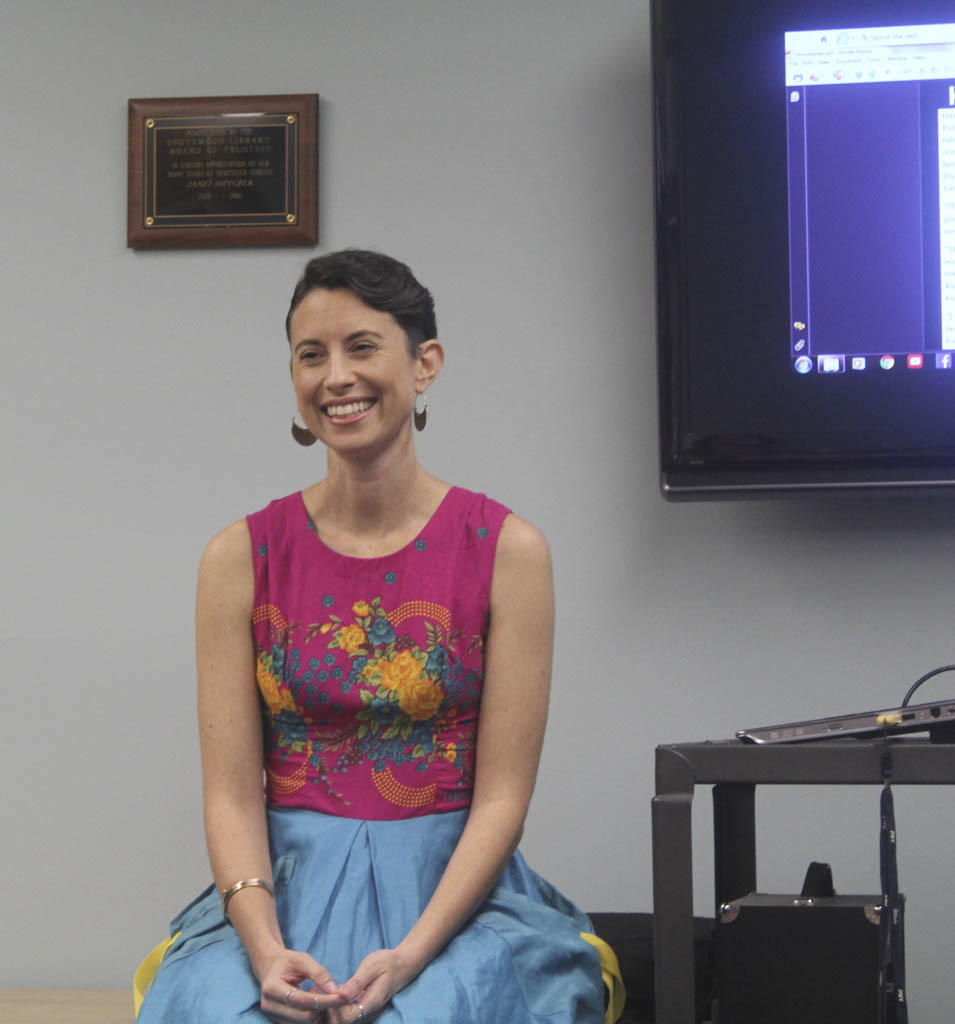SPOTSWOOD – To shed a light on media representations of Africa, the Spotswood Library welcomed Natasha Himmelman, a research associate at the University of Johannesburg, to facilitate a lecture about the 2006 film “The Last King of Scotland.”
Originally from Spotswood, Himmelman is of Puerto Rican descent and is a researcher and educator who works at the University of Johannesburg’s Visual Identities in Art and Design Research Centre in South Africa.
“We decided to host Ms. Himmelman’s lecture because she contacted us to say that she was returning to New Jersey for a vacation and would love to speak. Spotswood Library was her first library and she said it was where she was first introduced to the magic of books which has had a profound influence on her life,” said C.L. Quillen, director of the Spotswood Library.
The library hosted two screenings of the movie “The Last King of Scotland” so that residents could watch the film prior to Himmelman’s visit. The story of Ugandan dictator Idi Amin is told through the eyes of a young Scotsman who becomes the leader’s personal physician. Due in part to Amin’s unexpected passion for Scottish culture, Amin proclaims himself “The Last King of Scotland,” according to the production company’s website.
Himmelman began her lecture on July 27 by asking attendees their overall thoughts on the film and sharing her memories of the Spotswood Library. She then showed photos of the campus where she currently teaches.
“I like creating a space or advocating for a space to have conversations and ideally a critical media literacy would be wonderful,” Himmelman said.
The educator said the most common images people see in the news media about Africa include unofficial war, chaos, child soldiers, poverty, women and children in poverty, lack of structure/organization, starvation and wild animals, according to Himmelman.
Himmelman said that many people believe after watching “The Last King of Scotland” that the film is based on a true story. However, one of the film’s main characters, Dr. Nicholas Garrigan, played by James McAvoy, is actually based on fictitious doctor from Scotland and is not based on a real person. Furthermore, Himmelman explained that the film was based on novel written by Giles Foden.
She also noted stereotypes of Africa included in the film such as military tanks, soldiers, animalistic behavior, brutal violence and animal elements.
To elaborate, Himmelman talked about the concept of “Afropessimism” and how it is still recurring theme that can be found in films about Africa. Afropressimism is the belief that Africa is irredeemably doomed to backwardness and chaos, she said.
An opposite yet common theme that Hollywood tends to use is what Himmelman referred to as “The Mandela Effect,” which is a character that is a noble hero who stands up for what is right, she said. The character Dr. Junju, played by David Oyelowo, was an example of “The Mandela Effect.”
By the end of her lecture, Himmelman encouraged attendees to try to access different types of information about subjects that they are interested in, to remember that the media is powerful in reinforcing certain stereotypes, and to always ask questions when watching films and the news.
“We do plan to have more lectures in the future. The Friends [of the Library] recently had a lecture on the history of the Jersey Shore and we are working out the details for a lecture on horse therapy, bees and beekeeping, and seeing eye dogs. Dates and times have not been finalized yet,” Quillen said.
For more information about upcoming lectures at the library, visit www.spotslibrary.org.
Contact Vashti Harris at [email protected].

